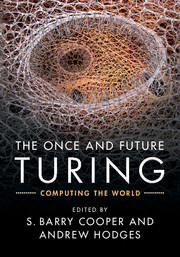Book contents
- Frontmatter
- Contents
- Contributors
- Preface
- Introduction
- Part One Inside Our Computable World, and the Mathematics of Universality
- 1 Algorithms, Equations, and Logic
- 2 The Forgotten Turing
- 3 Turing and the Primes
- 4 Cryptography and Computation after Turing
- 5 Alan Turing and Enigmatic Statistics
- Part Two The Computation of Processes, and Not Computing the Brain
- Part Three The Reverse Engineering Road to Computing Life
- Part Four Biology, Mind, and the Outer Reaches of Quantum Computation
- Part Five Oracles, Infinitary Computation, and the Physics of the Mind
- Afterword
- References
2 - The Forgotten Turing
from Part One - Inside Our Computable World, and the Mathematics of Universality
Published online by Cambridge University Press: 05 March 2016
- Frontmatter
- Contents
- Contributors
- Preface
- Introduction
- Part One Inside Our Computable World, and the Mathematics of Universality
- 1 Algorithms, Equations, and Logic
- 2 The Forgotten Turing
- 3 Turing and the Primes
- 4 Cryptography and Computation after Turing
- 5 Alan Turing and Enigmatic Statistics
- Part Two The Computation of Processes, and Not Computing the Brain
- Part Three The Reverse Engineering Road to Computing Life
- Part Four Biology, Mind, and the Outer Reaches of Quantum Computation
- Part Five Oracles, Infinitary Computation, and the Physics of the Mind
- Afterword
- References
Summary
In fond memory of Robin Oliver Gandy: 1919–1995
Introduction
Alan Turing is remembered for many things. He is widely known as code breaker and cryptographer, and as – at least in some sense – inventor of the computer. He is if anything even more famous as the father of artificial intelligence. Beyond that he was a mathematician, mathematical logician and pioneer in the study of morphogenesis.
Logicians remember Turing for his celebrated Entscheidungsproblem paper (Turing, 1937a), for work on the λ -calculus (Turing, 1937b) and, if they are cognoscenti, for his second great paper (Turing, 1939) in the Proceedings of the London Mathematical Society. All that work was completed by 1940. It is not widely appreciated that Turing's interest in logic continued to the end of his life. His later interest in the theory of types, a central area in the foundations of mathematics, is largely forgotten. That interest has had more influence than is evident. I am going to tell the story: it is an odd one.
The one and only student
My D.Phil. supervisor at Oxford was Robin Gandy: he was the only person to take a doctorate under Turing's supervision, and also one of his closest friends.
While Turing had only one student, Gandy had many. I was one of the the cohort from the early 1970s. Gandy rather liked the thought that his students were intellectual grandchildren of Turing. We mostly cared rather less about that, but from Gandy's reminiscences we all caught a glimpse of Turing through the eyes of someone who had known him very well. Turing met Gandy in 1940 at a party in King's College, Cambridge. Gandy was a third year student, while Turing, who had intermitted his Fellowship of the College at the start of the war, was already engaged in his celebrated work at Bletchley Park. During the war, Gandy became a friend and then much later Turing's student. By the end of Turing's life Gandy had begun his academic career as a Lecturer in Applied Mathematics at Leicester. You can read about their unique relationship in the Turing biography by Andrew Hodges (1983). Here I shall focus on Turing's influence on Gandy as his Ph.D. supervisor.
- Type
- Chapter
- Information
- The Once and Future TuringComputing the World, pp. 20 - 33Publisher: Cambridge University PressPrint publication year: 2016

